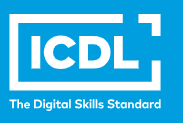Successful candidates will be able to apply good IT security principles to manage connections, devices, and data effectively and safely. After passing this module, candidates will feel confident keeping information and data secure.

The Cyber Security module covers the main skills and knowledge needed for the secure use of ICT in everyday settings, at home and at work.
For individuals and organisations, it is important to understand good practice in maintaining a secure network connection, using the internet safely and securely, and managing data and information. This module covers concepts around secure information and data, physical security, privacy, and identity theft.
As data and information are valuable, having the appropriate knowledge, skills, and awareness to protect them is beneficial in a wide range of job roles. The Cyber Security module helps workers and employers protect these crucial resources.
Main learning outcomes
Successful candidates will be able to apply good IT security principles to manage connections, devices, and data effectively and safely. After passing this module, candidates will feel confident keeping information and data secure. They will know how to reduce risk with good practice.
They Will Be Able To:
understand the key concepts of IT security
recognise good practice in protecting computers, devices, and networks
understand the types of risk that pose a threat to security
know how to use the internet and communication channels securely
recognise good practice in secure data management
ICDL Asia is a subsidiary of ICDL Foundation, the not-for-profit certifying authority of ICDL.
Established to guide the implementation of the ICDL standards in the Asian context, ICDL Asia manages the accreditation of a growing network of ICDL Accredited Test Centers (ATCs), and provides a focal point for the formation of partnerships with organisations who share our national economic development and capacity building goals.
ICDL Asia recognises the importance of digital literacy and ICT skills, and the urgent need for a more coordinated and effective action in driving economic development across Asia.
The quality and reputation of ICDL is built on over twenty-five years of experience in delivering our certification programmes to over 17 million people and in more than 40 languages worldwide, with more than 2.5 million ICDL tests taken annually.
Our success is maintained by our ongoing innovation in certification programme development, our commitment to rigorous test design methodologies, and consistent adherence to our quality assurance standards.
ICDL Foundation is an international organisation dedicated to raising digital competence standards in the workforce, education and society.
Our certification programmes, delivered through an active network in more than 100 countries, enable individuals and organisations to assess, build and certify their competence in the use of computers and digital tools to the globally-recognised ICDL standard.
As a non-profit social enterprise, ICDL Foundation benefits from the unique support of experts from national computer societies and partners worldwide to develop vendor-independent standards that define the skills and knowledge required to use digital technology effectively.
We work with education and training partners, local and regional authorities, national governments, international development organisations as well as public and private sector employers in all sectors, in the delivery of our programmes.
ICDL Foundation supports the initiatives of National Operators of the programme in Europe and the Arab States from our headquarters in Dublin, Ireland and our ICDL Europe office in Brussels, Belgium.
We have also established two regional operations – ICDL Africa (based in Rwanda) and ICDL Asia (based in Singapore). All ICDL Foundation operations work closely with regional, national and local partners to develop the global network of ICDL Accredited Test Centers.
Mission:
ICDL Foundation’s mission is to enable proficient use of Information and Communication Technology (ICT) that empowers individuals, organisations and society, through the development, promotion, and delivery of quality certification programmes throughout the world.
Values:
ICDL Foundation’s values are:
Social Responsibility: as a not-for-profit organisation, we are committed to improving digital skills proficiency within society. Our certification programmes are designed to be accessible to all citizens, irrespective of age, gender, status, ability or race.
Vendor Independence: our certification programmes give candidates the flexibility and freedom to acquire digital skills and confidently apply them in any software environment that they may be required to use.
Quality: we strive for continuous improvements in all that we do and ensure that our programmes are implemented to consistent standards internationally.
© 2025 coursetakers.com All Rights Reserved. Terms and Conditions of use | Privacy Policy